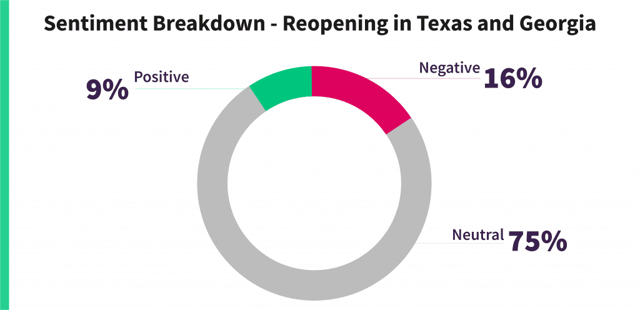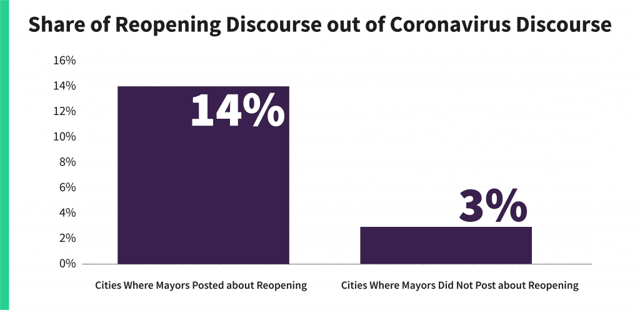State of Confusion: Talks of Reopening the Economy Raise Questions and Objections in Georgia and Texas

Noam Rabinovich
Product Marketing Manager
Co-Author: Michaela Sokol
The majority of the American population is currently under a stay-at-home or shelter-in-place order due to COVID-19. However, as a result of the economic impact from coronavirus, some states are beginning to discuss and implement the prospect of reopening the economy and easing restrictions, making way for “the new normal”. There are a few states spearheading this initiative; Texas Governor Abbott was the first to begin discussing the reopening of the state’s economy on April 17, followed by Georgia’s Governor Kemp, who started easing restrictions on April 24. But what exactly does “reopening” entail and how will this affect people’s everyday lives? These are questions many citizens have been asking. With these new laws bringing about a wave of confusion, clear and concise communication between residents and community leaders is of the utmost importance.
Zencity analyzed 533,981 interactions in 19 cities in Texas and Georgia over the period of April 12-25, as state heads began announcing reopening their states in the wake of coronavirus. We were able to conclude the following:
Reopening Generates Higher Negative Sentiment than Positive

In both Texas and Georgia, of those residents who had a clear position either in favor or against reopening, there was a preference for not reopening at this time (higher negative sentiment reflecting opposition to the decision to reopen and ease restrictions). At the time of both Texas and Georgia’s reopening announcements, there were those who opposed the Shelter at Home orders and called to reopen the economy, mostly motivated by the belief that the economic toll would be worse than the public health impact. On the other hand, counter-protesters advocated staying at home and maintaining the restrictions, showing a divide in residents’ attitudes towards the motion.
Negative sentiment reflects a belief that it is too soon to reopen. Many are concerned that the decision is driven by the prioritization of political or economic motives above saving lives and as a result, COVID-19 cases and deaths will surge. Many commenters expressed anger about this decision coming at a stage where numbers are still rising, especially given the absence of wide scale testing.
Ultimately, of those who had an opinion on the matter, negative sentiment was clearly greater than that of positive. However, and most notably, the bulk of residents felt neutral towards reopening. The general consensus being that it is not mandatory but instead, a choice offered to individuals and businesses on whether to reopen or go out, leaving others free to stay home if they feel unsafe.
Residents Express Confusion About Specific Aspects of Reopening
Texas and Georgia, being the states spearheading the “reopening” movement, demonstrate interesting takeaways about residents’ main concerns and areas of confusion. When looking at the discourse as a whole, most of the discussions consisted of questions regarding specific aspects of the new guidelines.
- Many residents struggled to understand whether new guidelines revoke current guidelines, especially as they relate to schools, parks and various businesses.
- Parks have remained a central issue in the comments about reopening guidelines, with people expressing confusion at the fact that while masks are required in parks, they are not mandatory in grocery stores.
- In regards to schools, the main issue that arose was whether the decision to keep schools closed for the duration of the school year means that remote learning will also stop.
- Another issue of concern was the ability of businesses to open while still complying with social distancing regulations. This was especially pertinent with respect to beauty salons and barbershop
Mayors Play a Vital Role in the Reopening Conversation

In cities where mayors spoke out about the state-wide orders, the issue accounted for a higher share of the discourse, and gained traction following the Mayors’ posts on this issue. In these cities discourse on reopening reaches about 14% of coronavirus-related discourse, compared to only 3% in cities where the mayors did not post about reopening. This shows the power city leadership holds in making state-level discussions more accessible to residents.
- This engagement was substantial and integral to the success of the reopening process, as it consisted of specific concerns raised by residents about reopening and concrete questions about various elements of the new guidelines, conversations that usually can’t happen as effectively on a state-level.
- With the decisions currently being made on a state-wide basis, it is still unclear for many residents if and how they will be adopted and implemented on a county and city basis, meaning the discussion on reopening is more theoretical. It is incumbent upon the city leadership to make state-level discussion accessible to residents, who look to the city for this information rather than their state capital, and to create city platforms to voice concerns about reopening and ask questions about the new guidelines.
TLDR: Reopening Calls for Clear Communicative Efforts by Local Govs
- As discussions on reopening take place on a state-level, residents show greater and more substantial engagement on this issue when their mayor posts or refers to this issue. Proving, it is on local governments to clearly and effectively relay updates to their residents, ensuring they feel secure entering this “new normal”
- The new guidelines or changes to existing regulations reveal certain areas in which residents express confusion, specifically as it pertains to the operations of schools, businesses and parks.
- Sentiment on reopening reflects wariness and concern about opening too soon and relaxing social distancing regulations and the possible toll on the public’s health.
- Issuing clarifications and creating city platforms for residents to ask questions and engage with local authority, could ease residents’ concerns and ensure that compliance is maintained despite the easings.
As local governments continue to face new coronavirus related challenges, Zencity is here to support them every step of the way. See how we are helping local governments bolster their crisis communication efforts and enhance their overall emergency response with our Coronavirus Action Plan.
%20copy-1.png?width=544&height=120&name=Logo_black%20(1)%20copy-1.png)



